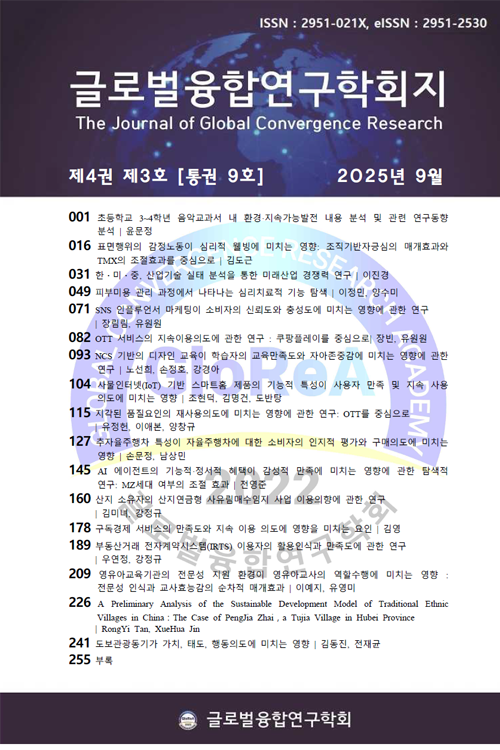- 영문명
- A Study on the Effects of NCS-Based Design Education on Learners’ Educational Satisfaction and Self-Esteem
- 발행기관
- 글로벌융합연구학회
- 저자명
- 노선희(Sun-Hee Noh) 손정호(Jeong-Ho Son) 강경아(Kyung-A Kang)
- 간행물 정보
- 『글로벌융합연구학회지』제4권 제3호, 93~103쪽, 전체 11쪽
- 주제분류
- 복합학 > 학제간연구
- 파일형태
- 발행일자
- 2025.09.30

국문 초록
우리나라에서는 다양한 직업교육 훈련기관과 민간 학원에서 NCS 기반의 디자인 교육을 운영하며, 전문 디자인 인재 양성을 위한 실무 중심 교육을 강화하고 있다. 이러한 교육은 학습자들이 취업을 준비하는 과정에서 실질적인 디자인 역량을 함양하고, 직무 수행에 필요한 능력을 체계적으로 습득할 수 있도록 구성되어 있다. 4차 산업혁명과 디지털 전환의 가속화에 따라 디자인 산업은 창의성과 문제 해결 능력을 갖춘 실무형 인재를 요구하고 있으며, 이에 따라 직업교육기관의 디자인 교육도 기능 중심을 넘어 학습자의 정서적 성장과 교육 경험의 질까지 포괄하는 방향으로 변화하고 있다. 특히, NCS 기반 교육은 직무 중심 교육의 표준화를 바탕으로 교육의 질을 확보할 수 있는 장점이 있지만, 학습자의 심리적·정서적 반응을 고려한 교육 효과에 대한 실증적 분석은 아직 부족한 실정이다. 이에 따라, 본 연구는 NCS 기반 디자인 교육의 구성 요소가 학습자의 교육만족도 및 자아존중감과의 관계를 실증 분석을 통해 확인하는 것을 목적으로 한다. 교육 구성 요소는 교육방법, 교육설계, 교수자, 공감성, 대응성으로 설정하였으며, 연구를 위해 직업훈련기관에서 NCS 기반 디자인 교육을 경험한 학습자들을 대상으로 설문조사를 실시하였다. 수집된 자료는 SmartPLS 4.0을 활용하여 분석하였다. 분석 결과, 첫째, 교육방법은 교육만족도에 유의한 영향을 미쳤으며, 둘째, 교육설계와 교수자 역시 긍정적인 영향을 주는 것으로 나타났다. 셋째, 공감성과 대응성 또한 교육만족도에 유의한 영향을 미쳤으며, 넷째, 교육만족도는 자아존중감에 유의하게 영향을 미치는 것으로 확인되었다. 본 연구는 직업교육 현장에서 운영되는 NCS 기반 디자인 교육이 학습자의 정서적 성과에 긍정적으로 기여할 수 있음을 시사하며, 향후 교육 설계 시 정서적 요인을 반영할 필요성을 제안한다.
영문 초록
In South Korea, various vocational training institutions and private academies have implemented NCS-based(National Competency Standards) design education to strengthen practice-oriented training and foster professional design talent. This type of education is structured to help learners develop practical design competencies and systematically acquire job-related skills in preparation for employment. With the acceleration of the Fourth Industrial Revolution and digital transformation, the design industry increasingly demands creative and problem-solving professionals. Accordingly, design education in vocational institutions is evolving beyond a function-centered approach to encompass learners' emotional growth and the overall quality of educational experience. While NCS-based education offers the advantage of standardized, job-centered curricula to ensure educational quality, there remains a lack of empirical analysis regarding its impact on learners’ psychological and emotional outcomes. Therefore, this study aims to empirically analyze the effects of the components of NCS-based design education on learners’ educational satisfaction and self-esteem. The components examined include teaching methods, instructional design, instructor, empathy, and responsiveness. A survey was conducted among learners participating in NCS-based design education programs at vocational training institutions, and the collected data were analyzed using SmartPLS 4.0. The results are as follows: first, teaching methods had a significant impact on educational satisfaction; second, instructional design and the instructor also showed positive effects; third, empathy and responsiveness were found to significantly influence satisfaction; and fourth, educational satisfaction significantly affected self-esteem. This study suggests that NCS-based design education in vocational settings can contribute positively to learners’ emotional outcomes and highlights the importance of incorporating emotional factors into future instructional design.
목차
1. 서론
2. 이론적 배경
3. 연구설계
4. 실증분석 및 결과
5. 결론
6. 감사의 글
References
키워드
해당간행물 수록 논문
참고문헌
최근 이용한 논문
교보eBook 첫 방문을 환영 합니다!

신규가입 혜택 지급이 완료 되었습니다.
바로 사용 가능한 교보e캐시 1,000원 (유효기간 7일)
지금 바로 교보eBook의 다양한 콘텐츠를 이용해 보세요!



